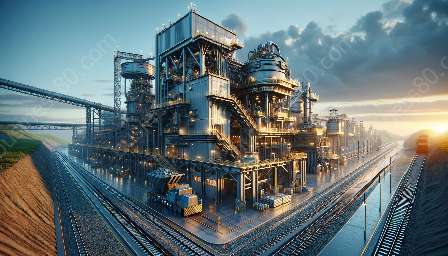Metallurgical processes play a crucial role in the extraction, production, and refining of metals. They are closely related to mineralogy and are integral to the metals and mining industry. In this comprehensive guide, we will explore metallurgical processes in detail, covering their significance, types, and impact on the mining and metal production sectors. We will also delve into their compatibility with mineralogy, highlighting their interconnection and mutual influence.
Understanding Metallurgical Processes
Metallurgical processes encompass a wide range of techniques and methods used to extract metals from their ores, refine them, and produce various types of metal products. These processes are vital in converting raw materials, such as minerals and ores, into usable metals for industrial, commercial, and scientific applications.
Significance of Metallurgical Processes
The significance of metallurgical processes cannot be overstated, as they form the foundation of the metals and mining industry. By enabling the extraction and refinement of metals, these processes fuel numerous economic sectors and contribute to technological advancements. Moreover, they are essential for meeting the global demand for metals and supporting various industrial and infrastructural developments.
Types of Metallurgical Processes
Metallurgical processes can be broadly categorized into pyrometallurgical, hydrometallurgical, and electrometallurgical methods. Pyrometallurgical processes involve the use of high temperatures to extract and refine metals, while hydrometallurgical processes utilize liquid solutions to achieve the same objectives. Electrometallurgical processes rely on electrical energy to transform ores into metals.
The Role of Mineralogy in Metallurgical Processes
Mineralogy, the study of minerals and their properties, is closely intertwined with metallurgical processes. Understanding the mineral composition of ores is essential for designing efficient extraction and refining processes. By leveraging mineralogical insights, metallurgists can optimize the utilization of raw materials, enhance process efficiency, and minimize environmental impacts.
Compatibility with Metals & Mining
Metallurgical processes are integral to the metals and mining industry, serving as the bridge between geological exploration, ore extraction, and metal production. As such, they are deeply intertwined with the broader metals and mining sector, influencing exploration, extraction, processing, and value addition activities. By aligning with the goals and requirements of the metals and mining industry, metallurgical processes contribute to sustainable resource utilization and economic growth.
The Impact of Metallurgical Processes
The impact of metallurgical processes extends across various domains, including environmental, social, and economic aspects. Efficient and eco-friendly metallurgical processes can significantly reduce the environmental footprint of metal production and ensure sustainable resource management. Moreover, they create employment opportunities, drive technological innovation, and bolster the global supply chain for metals and metal products.
Conclusion
In conclusion, metallurgical processes are pivotal in the extraction, refining, and production of metals. Their compatibility with mineralogy and their role in the metals and mining industry underscore their multifaceted importance. By understanding metallurgical processes and their interconnections with mineralogy and the broader metals and mining sector, we can gain valuable insights into the intricate mechanisms that drive the production and utilization of metals.

